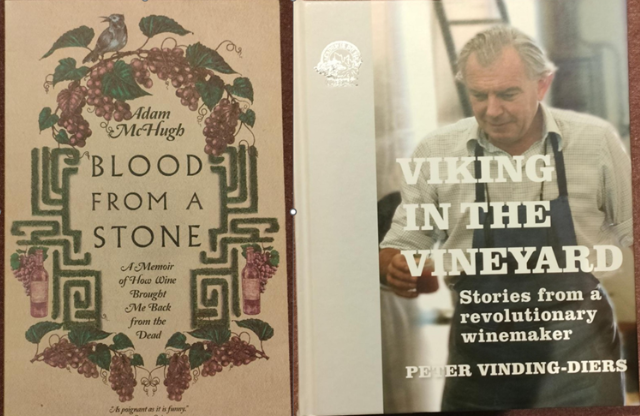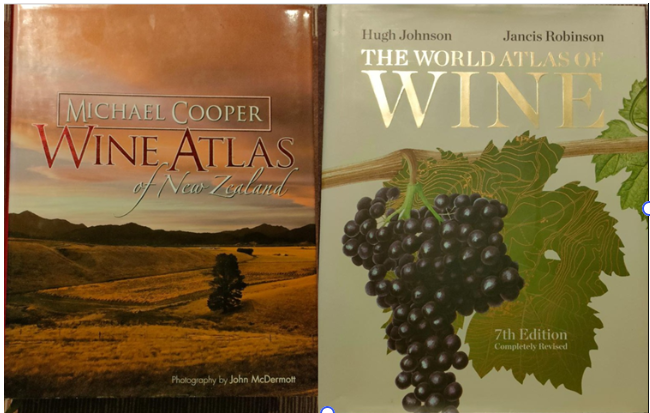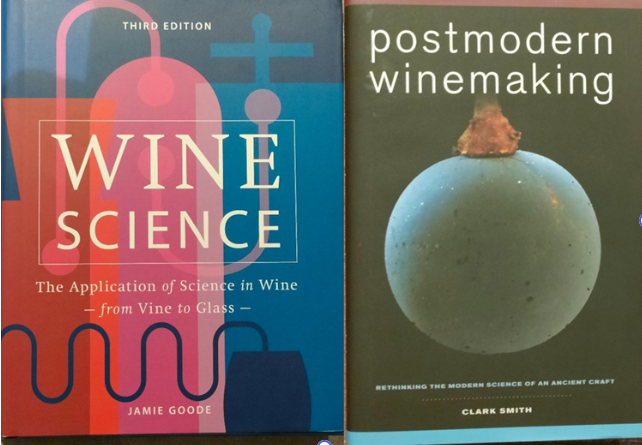“Blame it on the Boogie”, the song by Mick Jackson goes, although I was never clear on just what he was blaming. Since my creative abilities don’t extend to song-writing, this week’s blog is a blame narrative rather than song: “Blame it on Oz Clarke!”. In this case I’ll be clear what I (and perhaps even more my long-suffering wife) am blaming him for - taking me from someone who enjoyed drinking wine and from time to time “cellared” the odd bottle - to a true oenophile, a passionate student of wine, a collector of more wine in a purpose-built cellar than is fiscally responsible, a wine traveller, with every holiday squeezing in cellar-door visits around the world, and a hoarder of wine books.
Wine books to keep for reference, wine books you’ll read and keep, and wine books just to read.
Yes, blame it on Oz Clarke! The book in question was: Let Me Tell You About Wine: A beginner’s guide to understanding and enjoying wine first published in 2009 and reprinted three times since. I had just returned to New Zealand, a quality wine-producing country with low local prices and a huge export footprint, from Thailand, where most wine was imported and taxed to the max. I was looking forward to more affordable drinking but at the same time looking for direction about “what to drink”, and in my first month back, whilst browsing in a Wellington bookshop, this book in the 2013 reprint, caught my eye.

It wasn’t my first wine book. My very first was An Illustrated Guide to Wine by George Rainbird which I’d purchased in the 1980s in New Zealand before I moved to Australia. It was a good and quite comprehensive introduction but more than I was ready for and I’d left it behind in a box, eventually stored in my sister’s garage, where it remained until about 2017 when I rediscovered it. It now has a place in my library. My second wine book was the First Edition of Michael Cooper’s Wine Atlas of New Zealand, which I purchased immediately on its release for my return to New Zealand in 2002 and carefully studied the pages on Wairarapa wineries. Both of those were excellent and helpful.
My literary encounter with Oz Clarke was something else. Oz is one of many wine experts around the world – but nobody can write just like he does. He writes with passion and wit, and his love for wine is infectious. The moment he describes a wine experience, you just wish you were there experiencing it with him. The book is well organised into three sections: Part One: The Flavours of Wine; Part Two: Enjoying Wine and Part Three: The World of Wine. I read it from cover to cover and went back to it repeatedly. And now I just wanted to know more, to taste more! I’ve talked about my wine journey in a previous blog but it really took off from 2015 and it was reading that book by Oz Clarke that really got me going!
If you are looking to learn about the world of wine there are many books out there that are well-written and useful, but if you want to enjoy the reading, if you want to get a sense of the joy of wine discoveries, no better place to start than with an introductory book by Oz Clarke, and Let Me Tell You About Wine is one you’ll want to read and keep. After reading this there’s one more book of his that you might also want to read and keep. It’s called Oz Clarke on Wine: Your Global Wine Companion. The content is both a bit more recent and quite a bit deeper, but it’s still written in Oz Clarke’s inimitable style and best of all, the early chapters tell the story of his own fascinating and exciting journey into wine.

Wine books are being written all the time. Many are just another version of what someone else has done. Read them if you want, borrow them from a library, buy them if you have cash to spare and like to collect books. But from time to time a book comes out that just must be read because of the story it tells, or the unique insight it brings. These are books that you might borrow from the library, or if you are like me living in small town with a small library, buy the cheaper Kindle version to read on your next bus, train, or plane journey. Here’s some that I have enjoyed and learned from.
Wine Wars: The Curse of the Blue Nun, the Miracle of Two Buck Chuck and the Revenge of the Terroirists by Mike Veseth is a must read to understand how three forces have shaped the world of wine we have today: Globalisation, Commodification and Terroirism. What’s wonderful about the book is the way Veseth takes a serious subject and writes about it playfully, so you’re getting wine economics with cultural critique in a manner accessible and enjoyable to the simply curious, the novice wine lover, and the industry professional alike.
One of the great global wine events in my lifetime was the pitting of Californian Wines against the best of France in a blind tasting organised by Steven Spurrier with eleven French wine judges. What became known as the Judgment of Paris is now legendary and has spawned several books as well as the movie Bottle Shock. The best account I have read was written by someone who was present: George Taber and is simply called: Judgment of Paris: California vs France and the Historic 1976 Paris Tasting That Revolutionised Wine.
Shadows in the Vineyard by Jonathan Nossiter is a fascinating read about a criminal’s blackmail threats and attempts to poison the vineyard of Domaine de la Romanee Conti, which would destroy its reputation and ruin the owners, and the investigation and fight to save the vineyard. In the process of learning about the investigation you also learn all about DRC, Burgundy, the History of Wine and why the crime was seen as a direct attack on French heritage.
I have the Kindle versions of the above books so while I count these among books “just to read”, I do still have access to the contents. The next three books are also in my “just to read list” but I have the hard copies sitting proudly on my bookshelf. I love to read about people’s personal wine journeys, and the following are three among many I have enjoyed. First of these is Adam McHugh’s Blood From a Stone: A Memoir of How Wine Brought Me Back from the Dead. It tells the story of how McHugh, finding himself emotionally and spiritually depleted after burning out as a hospice chaplain and grief counsellor, rediscovers friendship, joy, purpose and a sense of place through the world of wine. Simultaneously poignant and humorous, reading it is both profoundly enriching and nurturing of hope.

I have a handful of books by New Zealand winemakers, but a favourite that I think might have broad appeal is called the Truant from Medicine: How a decent young doctor was seduced to the dark side by Ivan Donaldson, founder of Waipara winery Pegasus Bay. What I like about this particular book is how stories about winemaking and medicine are woven together.
Of more international appeal might be Viking In The Vineyard: Stories from a revolutionary winemaker by Peter Vinding-Diers, in which Peter, a Danish aristocrat, tells the story of his acclaimed global winemaking career, commencing in South Africa, passing through Bordeaux, Bulgaria, Brazil, Spain, Chile and Hungary and washing up in Sicily. An apparently restless soul with very definite opinions, not all of which I found agreeable, for example his dismissal of Nero d’Avola as “the horror which…never seemed to ripen and then only to give coarse primitive wines”. Nonetheless a worthy and stimulating read.
Whether you like books or not, if you are serious about wine, there are probably a few must buys for reference which you may (if you are a voracious reader like me) read from cover to cover, or you may just dip into when you want to know something in particular. A good world wine atlas with decent maps is a must have and it’d be difficult to go past The World Atlas Of Wine by Hugh Johnson and Jancis Robinson, now in its 7th edition.
If you live in a wine-producing country (and it seems there are fewer and fewer that don’t produce wine now) you probably want to have something similar that is specific to your country. For New Zealand there is simply no substitute for Michael Cooper’s Wine Atlas of New Zealand, now in its second edition. Across the ditch, Australians are similarly well served by James Halliday’s Wine Atlas of Australia. Of course, such atlases eventually date, the specific winery information changes first and over time the landscape changes, new wine areas open up etc, but I still regard these atlases as essential references.

A good reference to grape varieties will prove invaluable. The benchmark here is Wine Grapes: A Complete Guide to 1,368 Wine Varieties, Including Their Origins and Flavours by Jancis Robinson, Julia Harding and Jose Vouilamoz,, a 1200 page tour de force. I wish I had it. But it’s quite expensive and possibly more than anyone who is not a wine-professional needs. I have happily made do with Grapes & Wines: A Comprehensive Guide to Varieties & Flavours by Oz Clarke and Margaret Rand. What it lacks in mention of a few obscure grapes it more than compensates for with the engaging prose. Wine Spectator describes it as “An exhilarating book”.
If you have a favourite wine region in the world you might want a specific reference book for it. My first wine love (albeit hugely aspirational) outside of New Zealand and Australia was Bordeaux. And by now it will be no surprise for you to learn that the book that made an impression on me was another by Oz Clarke: Bordeaux. The Wines, the Vineyards, The Winemakers: A New Look At The World’s Most Famous Wine Region, 2012 edition. I read it from cover to cover and still refer to it, even though now some detail is dated. If Bordeaux is your thing, then the most current and hugely comprehensive is Jane Anson’s 670 page majestic Inside Bordeaux which I have also read, with determination and thirst for knowledge if not enjoyment, from cover to cover. If Burgundy is your thing, then its counterpart is Inside Burgundy by Jasper Morris. It’s a wonderful reference but I’m afraid I wilted at thought of reading all 798 pages.
When I travel to a wine region for the first time I usually look for a good, but accessibly short reference book to introduce me to the region before I visit. A few years back now I enjoyed the 310 page The Wines of Germany by Anne Krebiehl before my visits to the Pfalz, Rheinhessen and Rheingau, and referenced again before my recent visit to Mosel. Currently I am reading Matt Walls Wines of the Rhone. I have previously visited the Northern Rhone but not the vastly larger Southern Rhone and the book is already increasing my interest and desire.

I digress. I have mentioned the standard references, but I also want to mention a couple of other books that you simply must read and keep! Heading up that list is Jamie Goode’s Wine Science: The Application of Science in Wine – from Vine to Glass-. A rare blend of scientific rigour and engaging narrative, the book explains science in the vineyard and in the winery, balancing necessary technical detail with sheer readability. I literally devoured this book from cover to cover and keep returning to it to check or deepen my understanding.
The next may not be quite as engaging but is profoundly important: Neuroenology: How The Brain Creates The Taste Of Wine by Gordon Shepherd. This book will demonstrate that some of what you think you know about wine-tasting is simply wrong. It will also provide support and explanation for things you might have learned formally about wine-tasting in courses like WSET 2 or 3. It will profoundly impact how you taste in future.

Finally, two more books that I think you should read and keep in your library. Clark Smith’s Postmodern Winemaking advocates for a postmodern approach to winemaking that blends scientific precision with artistic intuition, embracing complexity, terroir and the unpredictable beauty of fermentation. He doesn’t shy away from technical analysis but insists that it should serve, not dominate wine. What I like is that he challenges the simplistic idea that “natural” is always better and is not afraid to challenge the dogmas of both traditionalists and modernists. He also gives some great case studies to illustrate his argument.
The other must have is One Thousand Vines by Pascaline Lepeltier, philosopher, sommelier and winery owner. The book, an English translation of Mille Vignes published in 2022, is a profound, but eminently readable, philosophical and ecological mediation on wine, taste and the human relationship to nature. In the book she fiercely advocates for wines made by growers rather than corporations, for environmental responsibility in viticulture, and for embedding wine drinking and taste in culture, civilisation and human relationships. It’s not a short book but it’s well-written and well-organised and I found myself saying “yes”, “yes” as I read.
These days there is a wealth of information about wine online, although a basic knowledge is required to evaluate it with good judgment. It can also be well-worthwhile to subscribe to one or two of the leading online wine-writing services – I personally subscribe to Jancis, Decanter, and in New Zealand, Real Review. These provide a good mix of current wine news, tasting notes on wines you might like to try and general information for reference. But there is no substitute for reading printed hard copy – the brain is engaged differently, and learning is deeper. I hope my musings about wine books, and their power inspires you to buy and read a book this week.
If you enjoyed this weekly blog, please also check out my website. You can subscribe to get this free in your email by using the contact form or simply emailing info@wineinsights.org. And of course, if you ever visit New Zealand and would like to explore Martinborough wines in the company of a professional wine guide, I am at your service. You can blame it on me!
Add comment
Comments